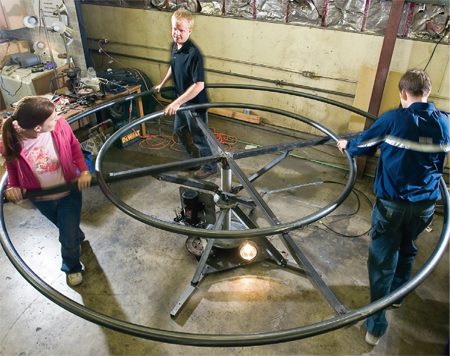In a time of isolation, reverence can draw society again into a circle of respect.

Reverence is fostered by a well-develped capacity for feeling awe at that which is awe inspiring.
I want to introduce an ancient myth, as modified by a wise man of antiquity. It’s the story of Prometheus, whose name means “forethought.” According to this story, Prometheus had a little brother named Epimetheus, which means “afterthought.” Epimetheus wasn’t very bright. The gods, however, gave him the task of distributing the means of survival to the different animals as they were born out of the earth. He gave speed and procreativity to rabbits. He gave shells to turtles, fangs and poison to snakes, claws and big teeth to lions. But when he came to the human beings, who were the last to emerge out of the mud, there was nothing left to give. So humans were left naked and unshod; they didn’t have hoofs, they didn’t have fangs, they weren’t very fast, and they weren’t very procreative. It looked as if they would die out. But luckily Prometheus, being quite a bit smarter than his brother, gave us what we needed to survive. He stole from heaven fire and technology.
But even that Promethean gift of fire and technology was not sufficient because human beings did not know how to form stable communities. They kept dividing, they kept fighting, they kept destroying and weakening each other so that wild beasts could make an end of them. Zeus, looking down on the chaos in the human scene and wanting to save the species, gave them one more gift—and this gift was a double-barreled gift—justice and reverence to be the foundation of community so that human beings would not perish from the earth.
The first time I read this story, I didn’t get it. I understood why justice was important. We need things to be fair and bad people to be punished and good people to be rewarded. But reverence? It seemed like a really old-fashioned idea. I couldn’t see what that had to do with the survival of the human species.

By kindling meaningful traditions and ceremonies, families and other groups can form circles of shared reverence.
But I’ve been thinking about it over the years, and I’ve realized that justice is not enough to provide us with the stable communities we need to survive. Justice by itself can be harsh, unfeeling, divisive. The losers in a court of law, even though they may deserve to lose, may be alienated and angry and bitter. There is a reason why courts of law are hedged around with reverent ceremony. The reason is that reverence pulls us together. And we need to be pulled together around acts of justice, and justice alone is not enough to do that. Justice by itself can divide us, but reverence pulls us together.
What do I mean by reverence? Reverence is an ethical virtue that is most important and valuable in human life when people have great power over others. Reverence is remembering not to carry on as if you were a deity of some kind. Reverence is this memory of being human, with all that that means, that is fostered by a well-developed capacity for feeling awe at that which is awe inspiring, because feelings of awe remind us of our humanity. Reverence is the basis for respect, and the language of reverence is ceremonial. Its effect on us is restraint in the use of power.
Reverence, when you’re mindful and paying attention, saves you from being too much in awe of yourself. And, let’s face it, we are not that awe inspiring as individuals. We are, after all, only human. We make mistakes. We’re not all that mysterious. We’re not proper objects of reverence. The opposite of reverence is arrogance, or overweening pride. The ancient Greeks called it hubris. They believed hubris was due to forgetting that you are, after all, only human.
This was the main theme of the ancient Greek tragic plays like Oedipus Tyrannus or Antigone—the hubris of mighty men and the dreadful cycle that leads from success to arrogance, from arrogance to blindness, from blindness to error, and from error to catastrophe that affects not only the leader who has hubris, but his people as well.
I knew this from reading Greek tragedy. What I didn’t realize until I started translating these poems is that many of the Greek tragedies include heart-felt hymns to reverence. And translating these plays and translating those hymns to reverence changed my life because it made me realize that the theme of these plays, and an important theme in our own lives, is not just the negative theme of avoiding hubris but the positive theme of cultivating reverence.
How is reverence expressed and how is it shared? How does it pull us together? One of the languages of reverence is music. I recently heard a wonderful concert in which a thousand people held their breath for a delicate pianissimo passage from Mozart played by a great pianist, Peter Serkin. There was a shared reverence in that moment. You might ask, reverence for what? The people in the concert hall were all of different faiths, and some of no faith. It was as though the clouds parted and there was a momentary vision of transcendent beauty. Without having an articulate agreement about what we were reverent for, without sharing a theology, without agreeing on a precise account of God or of our mission according to God, we were able to share reverence.
Reverence may also be experienced in the classroom. A reverent classroom is where learning is most likely to take place. In a reverent classroom neither the students nor the teacher interrupts. In a reverent classroom there is a ceremonial observance of respect. People raise their hands before they speak. They speak in turns. They address what other people have said because they are listening.
You may suppose that the ceremony of raising your hands and waiting to be called upon is an empty ritual. In America these days we tend to associate the words empty and useless with ceremony and ritual, but surely the ceremonies of a reverent classroom are not empty and they are not useless. There is a kind of reverence in the classroom—reverence for what is to be learned, for the truth, which is awe inspiring, somewhat mysterious because no one in the room knows all of it, and not under anyone’s control.
I want to turn now to the issue of family. I think reverence is the difference between family and a group of people gathered for convenience; reverence is also the difference between a home and a shelter where people sleep and eat. All cultures need to keep the family circle healthy because the family circle is foundational for a healthy society. Family, however, is subject to change. After our children went away to college, we began to discard what had been a very important ritual with us—the family dinner. Without the children, why were we doing it? With just two people, it didn’t feel like a family dinner. Then one night, my wife had the brilliant idea to light a candle at the dinner table. Somehow that changed things. The candle pulled us in. We have to sit close together to share the light of a candle. Gradually we recovered a sense of the importance of the family dinner, even though the family had changed.
I told this story to a woman from Nigeria who grew up in a village where, she told me, after dinner the villagers sat around a fire where the elders told stories about the family and the history of the village so people knew their genealogies and knew the family stories. Last year she went back to her rural village, and the fires had gone out. In every hut there was a TV with a satellite antenna. People were isolated, and there was no more role for the elders to tell the stories that kept the people together.
So much now isolates us from one another. All the more reason to light the candle. So I put this question to you: What can you light—in reality or metaphor—that can bring people into a circle of willing participants?
The ancient Chinese knew the importance of the family circle. They hedged it around with many ceremonies. In a Confucian family, a small child is taught to greet the elder members of the family, each one with his own special token of respect. This same child, if he grows up to be an emperor, will remember this habit of respect and treat those he rules with respect. That, I think, is the goal. If you know a Confucian family, you will know that they are wonderfully harmonious. When I give advice to a Chinese student who belongs to a Confucian family, I find I am wasting my breath unless I address family concerns, because that student will not think of himself as an individual but as part of a family that makes decisions together.
Confucian China began to unravel when people began to fear that ritual was empty and meaningless. There’s a huge cost to letting your rituals and ceremonies become empty. Reverence is what keeps your ceremonies from being empty. That’s the main message of the Confucian analects—don’t let your ceremonies become empty, fill them with the appropriate feeling, which is reverence.
We have preserved some reverence in our society. We need to build on that. Especially in this community, you have preserved reverence, and you have a foundation to build upon.
So my advice for maintaining and renewing reverence in your lives is first to speak the language of reverence with feeling. The language of reverence includes music and ceremony. Second, kindle the lights that bring people into circles of shared reverence. You must find what those lights are. And most important, pay attention. Be silent when silence is called for. Be mindful of what is awe inspiring. Be mindful of each other. Be mindful of everything from your roommates’ concerns to the songs of the birds to the majestic mountains.
Paul Woodruff is the Darrel K. Royal Professor in Ethics and American Society at the University of Texas and the author of the book Reverence: Renewing a Forgotten Virtue (Oxford, 2001). This article is adapted from his BYU forum address given Jan. 25, 2005.
Access audio of Paul Woodruff’s entire address.









